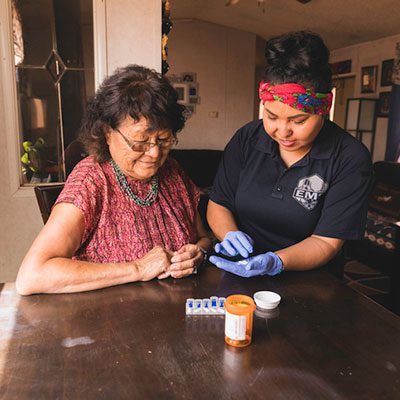Maternal health is a crucial indicator of population health. But for Native Americans in the U.S., maternal health can be a matter of life and death. According to the Centers for Disease Control and Prevention (CDC), Native American women are 2.3 times more likely to die from pregnancy-related causes than white women. Globally, maternal mortality is decreasing, yet Native American maternal health still lags.
Native Americans experience higher rates of maternal morbidity, which includes severe maternal complications, postpartum depression, and chronic conditions. Recent data indicated that Native Americans are twice as likely to experience severe maternal morbidity than non-Hispanic white people.
Native Americans also have higher rates of infant mortality, low birth weight, and preterm birth than other racial/ethnic groups. These disparities reflect the discrimination and neglect that Native American communities have experienced in accessing quality primary and preventative care, OB care, and social services — historically and today.
Putting a face to the crisis: One woman’s story
Stephanie Snook was a member of the Tsimshian and Tlingit tribes of Alaska. She was a resident of Seattle in the summer of 2019, when she was expecting twins. Already a mother of two, Snook knew that a third pregnancy was risky due to her congenital heart condition. As a precaution, she switched from a community health clinic to a high-risk maternal-fetal specialist.
Speaking out for Indigenous women
When Snook was beginning her third trimester, NBC News invited her to participate in an article about maternal mortality. Snook was an activist who spoke out on causes affecting Indigenous women, so she agreed to participate. However, she died before the interview could occur.
Despite an emergency C-section, neither Snook nor her babies survived. Their deaths brought the issues of maternal mortality and morbidity in Native American communities back to the forefront. Many wondered whether Snook had received insufficient care.
How she fell through the cracks
At Snook’s regularly scheduled 35-week appointment — the day before she went into cardiac arrest — she reported difficulty breathing, along with frustration with her healthcare provider because of treatment delays. She was experiencing shortness of breath, and a co-worker recalled that she was in distress.
Urged to go the hospital, Snook had to first go home to arrange care and transportation for her son and daughter, then get a ride for herself to the hospital. Unfortunately, she did not make it there in time before experiencing cardiac arrest. Due to a delay of at least 20 minutes while paramedics worked to save her life, Snook and her unborn babies all experienced irreversible brain damage.
Obstacles to improvement
NBC’s commentary on Snook’s death suggested that racial miscategorization on death certificates could be masking an even higher maternal mortality rate for Indigenous people. It also pointed out that Washington state’s Department of Health downplayed the results of its own maternal mortality review panel in 2019, stating that the number of maternal deaths reported — though higher than the national average — was not statistically significant due to the relatively small size of the American Indian and Alaska Native population.
Even more troubling, NBC reported on discriminatory experiences of Indigenous maternal patients. One former patient recalled being aggressively interrogated about her drinking habits and substance use. Experiences like this deter patients from receiving needed care and perpetuate the Native American maternal health crisis.
Causes of Native American maternal health disparities
The causes of Native American maternal health disparities are interdependent and often coexist, creating complex, multilayered impacts. They include:
- Poor social determinants of health, such as unemployment, poverty, lack of education, food insecurity, environmental pollution, and violence
- Institutional racism and implicit bias in society and in the healthcare system, which overlooks the concerns of less visible or empowered populations and engenders harmful assumptions and stereotypes about population groups
- Health system factors, such as inadequate funding and staffing for the Indian Health Service (IHS) and other agencies that provide health care to federally recognized tribes
- Cultural and linguistic barriers, such as a lack of respect, trust, and communication between healthcare providers and the Native American patients they serve
- Historical and present-day trauma, which has led to generational impacts in physical and behavioral health as well as economic and social disadvantages.
- Inadequate perinatal OB care, screening, and treatment for Native Americans, which increases their risk of developing and dying from pregnancy-related complications
- A higher prevalence of preexisting health conditions, such as obesity, hypertension, diabetes, heart disease, and mental illness
- A higher prevalence of adverse childhood experiences, exposure to physical and sexual violence, and unhealthy behaviors such as smoking and substance use
The CDC estimates that 60% of all maternal deaths in the U.S. are preventable. This percentage is likely higher for Native Americans, who may not be receiving care for treatable perinatal conditions, such as hemorrhage, infection, hypertension, and diabetes.
Native American maternal and infant health impacts
The impact of maternal health disparities has been devastating to Native American communities. Maternal mortality and morbidity not only affect the health and well-being of pregnant people, but also their children, partners, and extended families. Maternal deaths can have long-term consequences for children’s physical, mental, and emotional development, as well as their educational and economic opportunities.
The loss of a child can also cause immense grief and trauma for parents and families. Repeated losses can wear down the resilience and strength of Native American communities, which have already endured centuries of colonization, genocide, and forced assimilation. Maternal and infant health are not only personal issues, but also political and cultural issues, as they affect the survival of Native American nations and their ability to preserve their culture for future generations.
Maternal health solutions and recommendations
Addressing the Native American maternal health crisis requires comprehensive and coordinated action from multiple stakeholders, including healthcare organizations and providers, governmental entities, and Native American communities. Recommended initiatives are:
- Increase funding and resources for the IHS and tribal health programs — which are chronically underfunded and understaffed and have aging facilities — to improve the availability and quality of maternal health care for Native Americans.
- Expand Medicaid eligibility and coverage for Native Americans to increase access to affordable and comprehensive healthcare services.
- Strengthen healthcare education on evidence-based practices for all care providers serving Native American communities, including maternal health and OB providers and clinicians.
- Implement and support culturally appropriate, evidence-based maternal health programs — such as midwifery, doulas, and home visiting services — that respect and honor the traditions, values, and preferences of Native Americans.
- Enhance the recruitment, retention, and training of healthcare providers from or knowledgeable about Native American communities, especially those who specialize in maternal health, to increase the representation and diversity of the healthcare workforce and improve the cultural competence, awareness, and sensitivity of healthcare delivery.
- Strengthen the data collection and reporting on Native American maternal health outcomes and disparities, which are often missing or inaccurate, to monitor the progress and challenges of improving maternal health for Native Americans.
- Engage and empower Native American communities in the design, implementation, and evaluation of maternal health policies and programs to ensure that their voices, needs, and rights are respected and addressed.
It is important to reverse the mentality that attributes poor maternal outcomes to patients’ deficiencies. These efforts are misplaced, inaccurate, and will not be successful. Instead, we must focus on correcting systemic issues that create poor outcomes for these populations.
How Relias can help
Healthcare organizations and providers can take responsibility for helping to turn the tide. One powerful way to do this is by educating healthcare staff on evidence-based best practices surrounding all facets of clinical, behavioral, and social factors that comprise Native American health.

Evidence-Based Government Healthcare Training Solutions
Relias can help your government organization improve patient care and outcomes with our proven, data-driven solutions. We support your clinicians on their journey to competency — and your organization’s journey to excellence.
Explore solutions →






